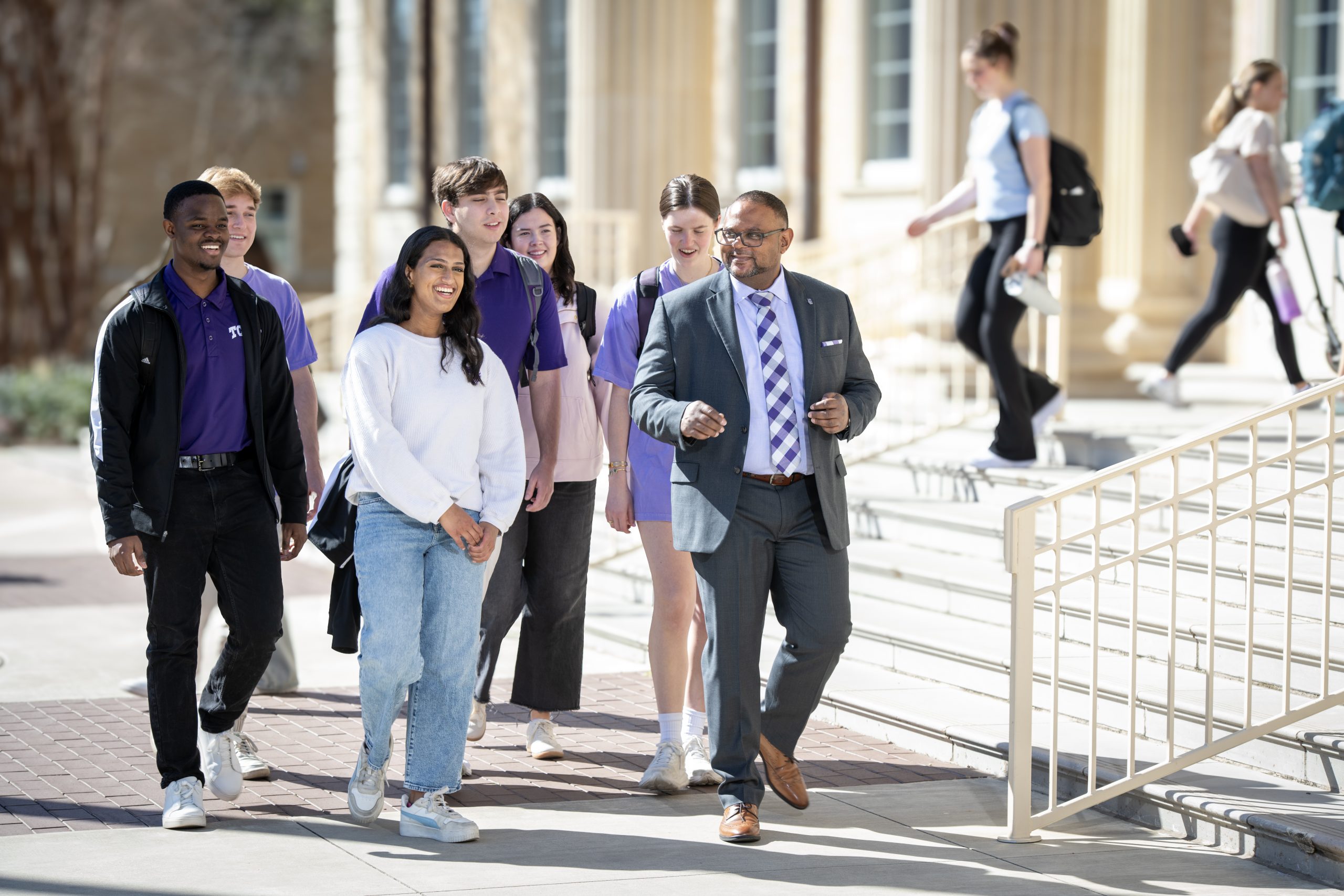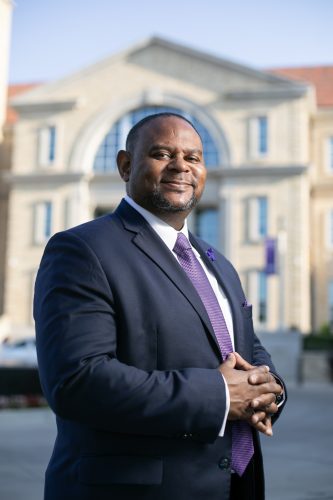
“Education made a generational change for me, and I want to pass that forward,” Provost Floyd Wormley Jr. says. Photo illustration by Kris Copeland | Original photo by Geno Loro
As TCU Provost, Floyd Wormley Jr. Leads with Heart, Humor and Hard-Won Wisdom
Floyd Wormley Jr. grew up in Biloxi, Mississippi, in a household held together by his single mother. In a military town where most young people’s tickets out came with boots and dog tags, Wormley assumed his future would march in that same straight line.
Then came a simple question from a friend’s parent that changed everything: Have you ever thought about college?
Assisted by a scholarship and intrinsic willpower, Wormley enrolled at Tulane University in New Orleans, where his pre-med plans soon met the real nature of his intellectual passion. One biology class in, he was hooked. “Cellular and molecular biology,” he said with the ease of someone who has uttered the words thousands of times. “My major had a fancy name.”
He was the first in his family to graduate from college.
“There were days I thought about transferring,” he admitted of his early days at Tulane, when he sometimes felt like a poor kid in a rich world. “But I stayed because I didn’t want it to look like I quit.”
He also stayed because he had met his future wife, Zina, in his sophomore year. “We are both very firm in our faith,” she said, “and we believe that people are where they’re supposed to be.”
Wormley would go on to earn graduate degrees in microbiology and immunology from Louisiana State University Medical Center and complete a postdoctoral fellowship at Duke University. He built a formidable research résumé by specializing in immune system responses to persistent fungal infections.
During his PhD studies, “to make ends meet, he was working nights at Charity Hospital,” said Wormley’s mentor, Paul Fidel, a professor in the department of oral and craniofacial biology at the LSU Health Sciences Center in New Orleans. “Night-day, night-day, getting in the lab early, getting a few hours of sleep. … He never complained, absolutely never complained.”

As provost, Floyd Wormley Jr. aims to help faculty and students grow and serve the community. “Everything we do should improve our faculty, our students, our community — and TCU’s reputation.” Courtesy of TCU Marketing | Geno Loro
Wormley’s first tenure-track professorial role was at the University of Texas at San Antonio. He was the colleague who kept saying yes to service roles, eventually becoming an associate dean of research at UTSA and later overseeing graduate education. He said he loved being a science professor and fell into academic leadership almost by accident. “It was my opportunity to influence things for the better for my colleagues.”
Fidel said his protégé’s scientific backbone informed his administrative leadership. “His way of dealing with problems comes from those critical thinking skills. He’s able to look at a lot of different scenarios and then go down different paths until it closes off and moves to the next path.”
When TCU called in 2019, offering the chance to lead research and graduate studies, it checked all the right boxes: mission and values alignment, a research agenda on the rise and location, as Fort Worth is Zina Wormley’s hometown.
As associate provost, Floyd Wormley helped steer TCU into a new and ambitious research route, expanded support for graduate students and strengthened infrastructure for online programs. He accomplished it all with humor, grace and relational know-how, Zina Wormley said. “He has a really great way of letting people feel seen and heard, and he is always quick to listen.”
In 2025, Wormley was named provost and vice chancellor for academic affairs.
He described TCU as a place where people aren’t just committed to the work — they’re committed to one another. “The attention paid to making sure faculty, staff and students know they’re valued? That’s something you don’t see everywhere,” he said. “We shouldn’t take it for granted.”
Wormley, a Baptist church member who occasionally delivers sermons, brings both analytical rigor and pastoral care to academic leadership. He applies the same methodical preparation to campus matters that he once brought to scientific research.
“HIS WAY OF DEALING WITH PROBLEMS COMES FROM THOSE CRITICAL THINKING SKILLS. HE’S ABLE TO LOOK AT A LOT OF DIFFERENT SCENARIOS AND THEN GO DOWN DIFFERENT PATHS UNTIL IT CLOSES OFF AND MOVES TO THE NEXT PATH.”
Paul Fidel
That scientific thinking extends to his view of education itself. Information alone isn’t enough for students, he believes; they need to apply it. “Learning the mechanics of throwing a pitch and being able to throw a pitch that gets across the plate in the strike zone are two very different things,” he said. “Our job at TCU is to ensure that when our students leave, they can throw fastballs that hit the strike zone every time.”
Off campus, he’s a father to two teenagers who mock his occasional “struggle meals” — microwave nachos and fried Spam. (Don’t listen to them, Zina Wormley said. Her husband is a talented chef who has won awards for his gumbo, and his coconut cake is a holiday favorite.)
Beyond the kitchen, Wormley’s children enjoy lives that are very different from his at their age. And that, he said, is the point.
“We do what we do so that we can make a generational change in the lives of our students,” he said. “Education made a generational change for me, and I want to pass that forward.”
When the job is hard, he thinks about commencement. About the student who gets into medical school. The one who lands a job, opens a business, returns with a story of transformation. “That’s the why,” he said. “It’s bigger than us. And I want everybody to see that it’s bigger than us.”
Wormley sat down with TCU Magazine for a candid conversation. What follows are highlights from that exchange.
As TCU’s chief academic officer, what do you see as your most important responsibility?
We must ensure academic excellence in every dimension — the classroom, the field, the theatre, the studio. That means giving faculty and staff the resources to create the best possible environment for students. We are not a massive state institution with tens of thousands of students and a mandate to be everything to everyone. Whatever we do, we must do exceptionally well.
TCU’s LEAD ON: Values in Action strategic plan emphasizes growing as a prominent center for research and creativity. As provost, what are your immediate priorities to advance TCU’s research agenda?
The first step was hiring an outstanding vice provost for research — and I believe we achieved that in Dr. Reuben F. Burch V. Next, we assess the aspirations of our students and the needs of Dallas-Fort Worth to decide where to focus. STEM fields are critical, but so are our strengths in theatre, art and music. We will invest in these areas and partner with corporations and community organizations — not simply to fill jobs, but to produce leaders who set the standard in their fields.

Leading with both analytical rigor and pastoral care, Floyd Wormley Jr. advances TCU’s mission to deliver excellence across teaching, research and student experience, including the university’s push toward Carnegie R1 status. Photo by Rodger Mallison
En route to TCU’s goal of becoming a Carnegie R1 university, the top tier for research, what specific milestones do you envision in the next three to five years?
Our plan calls for increasing research expenditures by at least 10 percent each year — and I emphasize “at least.” We are expanding doctoral programs and providing greater support for graduate students. That requires stronger infrastructure in our research and graduate studies offices. Priority areas include AI, engineering, data science and computation, along with upgraded facilities for the fine arts. Every discipline will see our commitment to excellence, even if not all at the same time.
Beyond traditional metrics like funding or new buildings, how will you measure the success of TCU’s expanding research enterprise?
Student outcomes are central. Are our students getting higher-paying jobs? Are they admitted to professional and graduate schools at higher rates? Are undergraduates publishing with faculty? Is the curriculum enriched by our scholarship? Citations and publications matter, but so does involving students and serving the community. Everything we do should improve our faculty, our students, our community — and TCU’s reputation.
TCU prides itself on its teacher-scholar model. How do you define a “teacher-scholar” today, and why does this model work here?
I emphasize a capital “T” and a capital “S.” Our faculty stay at the forefront of their fields, publish in their areas of expertise and bring that knowledge back to the classroom. We don’t have researchers who are detached from teaching or teachers disconnected from scholarship. It’s a two-way corridor — scholarship informs teaching, teaching shapes scholarship — and both are stronger for it.
What resources and support will be available to help faculty grow as both exceptional educators and impactful scholars?
We are creating an Office of Faculty Success to support professional development for faculty at every career stage. Our Office of Research and Creative Activity will focus on scholarly growth, and we will strengthen mentoring for junior faculty. Expect more workshops on pedagogy, teaching methods and research skills. We will be intentional about helping faculty excel in both teaching and scholarship.
What is the Innovation Network, and how will it engage students?
Led by our chief innovation and strategy officer, Tom Wavering, the Innovation Network will be a distributed system rather than a single hub. Students will connect with innovators and companies, access makerspaces and work on real-world projects through programs like our real estate and entrepreneurship centers. The aim is to bring the community into our campus — and our students into the community.
What role does technology play in helping faculty and students engage in transformative research and discovery?
Employers expect graduates to arrive with strong technological skills. We will invest in the infrastructure to meet that demand and train our campus community to use it well. AI and machine learning have applications across disciplines, from liberal arts to business to the arts, and we will be deliberate in weaving them into the curriculum.
Any predictions for what research and creative activity will look like in five years, once AI is more integrated?
It’s hard to predict because the technology changes so quickly. That’s why we must be thoughtful about how we use it. We want our faculty, staff and students to embrace AI, but also to know how not to misuse it and to use it humanely. That responsibility is part of our mission as a university.
How will TCU’s research efforts impact Fort Worth and North Texas?
We will partner with local industries on AI and aerospace and continue our leadership in the cultural community. On the biomedical side, we will help address shortages of nurses, physicians, occupational therapists and other health professionals. Our medical school, nursing programs and new health sciences initiatives are designed to meet this region’s most urgent needs.
Editor’s Note: The questions and answers have been edited for length and clarity.

Your comments are welcome
4 Comments
Congratulations to my childhood friend what a amazing achievement,I knew from our day’s growing you would do amazing things Floyd….So continue the awesomeness my friend love you and continue striving with God!!!
Congratulations Dr. Worley your Antioch Family in San Antonio is proud of you!
I love YOU, and I know you know it. Tell your wife that I hope to see you all soon. You are a Doctor, a Leader and everything I knew you’d become.
Ced
Congratulations my brother, you have ALWAYS been outstanding!!! Our community is so proud of you and all you have accomplished!!
Related reading:
Research + Discovery
Advancing Medicine
The Scholarly Pursuit and Thesis program gives students a competitive edge.
Features
Defining the Moment
As TCU’s 11th chancellor, Daniel W. Pullin is charting an ambitious future for the university.
Features
From the Chancellor
Research excellence is driving our future.